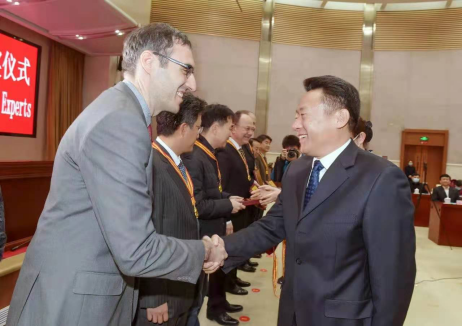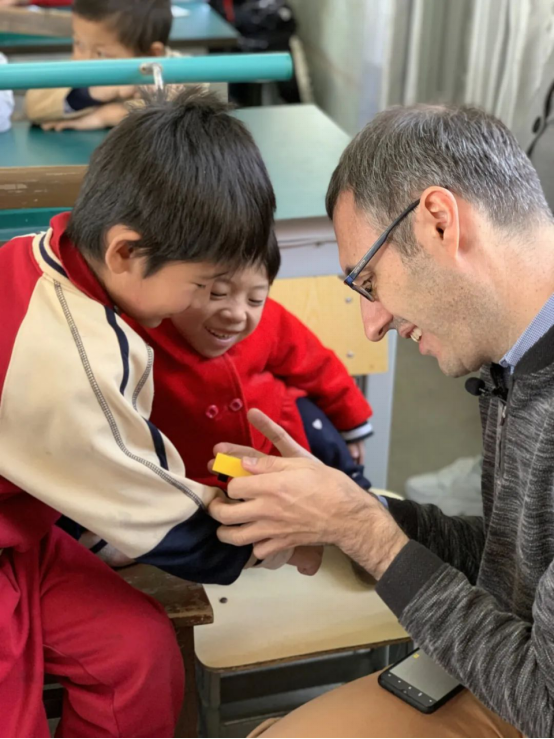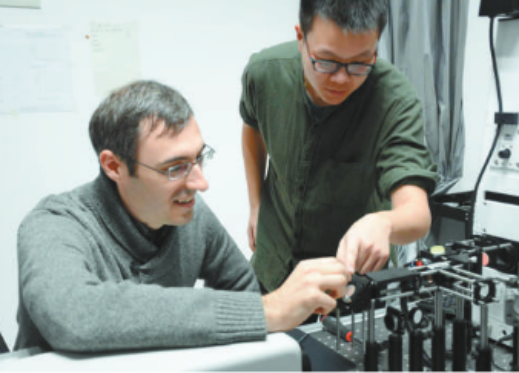On December 16th, the municipal government of Hefei held the third Hefei Friendship Award Ceremony. Zachary J. Smith, a foreign expert of the School of Engineering Science of the University of Science and Technology of China, is the recipient of this year's honor.
LING Yun, Mayor of Hefei, and YU Aihua, Secretary of the Hefei Municipal Party Committee, presented the award to Zachary Smith for his contribution to Hefei and Anhui Province's development in culture and education.

Zachary receiving the Hefei Friendship Award. (Image by the Ceremony organizer)
Zachary J. Smith is an American scientist who graduated from the Department of Optics of the University of Rochester. He completed his postdoctoral studies in the Bio-photonic Center at the University of California, Davis, and became a professor in the Department of Precision Machinery & Precision Instrumentation of the University of Science and Technology of China in 2015. His research focuses on microscopy and spectroscopy used for biological life research.
The Hefei Friendship Award is the highest award established by the municipal government of Hefei to honor foreign experts who have made outstanding contributions to the economic and social development of Hefei. Since its launch, a total of 30 foreign experts have won this prize.
In recent years, the Office of International Cooperation, in collaboration with various departments of the University, has been actively recruiting foreign experts and dedicated to provide a friendly environment for them to live, research and teach.
"I hope everyone can be happy!"
—An exclusive interview with Prof. Zachary J. Smith from USTC
By LI Zhao from Science and Technology Daily
It has been three years since I first met the couple, Prof. CHU Zhake (Zachary J. Smith) and Mrs. CHU Kaiqin. In 2018, during the first Charming City media trip, I came to the long-admired University of Science and Technology of China (USTC) and there I met Zhake—a vigorous young man. He came to Hefei in September 2015 and established his own laboratory from scratch. In just five years, one of the Ph.D. graduates of his lab was employed by Xidian University as an associate professor.
During the pandemic this year, Zhake actively spoke out on the media to support and tell the truth about China's fight against the pandemic. His recorded video of cheering for China touched countless people. On December 17, the third Hefei Friendship Award was released, and the shy American boy, Zhake, once again appeared in front of the limelight.
I hope everyone can be happy!
This morning's interview lasted more than two hours. When I asked Zhake to look into the next five years, I thought he would say something about his academic and scientific expectations, but he simply said, "I hope that everyone can be happy, all students are successful and my researches are really useful!" A serious scientific researcher as he is, he is really sunny and warm inside.
What surprised me even more was that when I interviewed him in February this year, he could only communicate in English, but today he can answer questions in Chinese fluently. He attributed his improvement of Chinese to the TV series he had watched during the pandemic. Zhake recommended the Chinese TV series A Love for Separation (《小别离》) to me. He praised parenting ideas in those as "advanced" and share similar principles as the choice of scientific research direction of today university students.
On October 23, the couple visited Liufan Primary School of the the Dabie Mountain area at Yuexi County, Anqing City, Anhui Province for the first time. They were here to bring a unique science popularization class – "the scientific basis of imaging" to the children here.
The class was very interesting and after the class, the passionate little science lovers prepared hundreds of questions for Zhake. One of the children asked, "How can I go to work in your lab?" Zhake gladly replied, "Then you have to study hard now and get into USTC when you grow up!"

Zhake with children at Liufan Primary School. (Image by LI Zhao)
Zhake said that he gained a lot from the science class. In China's vast countryside, there are still so many children who are left behind since the parents are out in city to make the family living. They are in need of care and love, both emotionally and intellectually. Poverty alleviation through technology and knowledge is actually the more important one.
Zhake asked before leaving the school, "When is available for me to revisit?"
China's scientific research level is improving steadily.
Zhake told me that when he studied in the U.S. for his doctoral degree, there were many classmates from USTC who were super bright and friendly. Later, by chance, he met a professor from the Department of Precision Machinery & Precision Instrumentation of USTC at an international academic conference, and he was warmly invited to come to Hefei for a visit. Following his advice, he came here without much consideration and moved by the enthusiasm of teachers and students of USTC to scientific research, he has stayed here for five years. Now he has mentored more than a dozen students, and one of them became directly an associate professor after graduation, which makes him very proud.
According to Zhake, China has seen fast progress in science and technology in the past five years, not only in the number of papers, but also in the strength and level of scientific research. The rigid evaluation standard, however, has always been a stubborn problem that restricts innovation. The current criteria of the scientific research system requires papers, but certain research, especially technologies of industrialized application, is difficult to achieve something in the short term. Papers cannot be guaranteed. The paradox has led to a flurry of short and quick projects that are easy to produce results and publish papers. In the long run, important subjects that related to the lifeblood of the country will be ignored, and ultimately science and technology innovation will suffer. But the good thing is that Chinese authorities have recognized the danger of this paper-oriented assessment. For example, USTC had been given policies on basic mathematics and other subjects, encouraging students to do scientific research without rushing to get results.

Zhake with one of his students cunducting research. (Image by LI Zhao)
Zhake predicts that in five years, China's scientific research will be completely different from that now, and will lead the world in scientific research. "Currently the most sought-after destination for studying science and technology in the world is still the United States, but I believe that in the future more people will choose China and USTC."
Brave yet down-to-earth, to research and to practice.
When he first came to USTC, Zhake was not very fluent in Chinese, which is why many students did not dare to take his classes or choose him as a tutor. But in the past five years, Zhake became so popular among students that sometimes he had to make the painful choice of choosing two or three students from eight or nine equally outstanding applicants.
When comes to his criteria for choosing students, his answer is "brave yet down-to earth". Scientific research is a long way to go, and only those who are both brave and down-to earth can make it to the end.
Zhake not only attaches importance to research, but also pays attention to public welfare causes. With the help of a professor in USTC, Zhake's team, working with Chongqing Children's Hospital, developed the world's first rapid test for thalassemia, which can get test results in less than 5 minutes at a cost of less than $1.5 per test.
Thalassemia detection is a worldwide problem. In southwest China, especially in Guangxi, there are a large number of thalassemia patients. Zhake's scientific achievement has brought a boon to them.
Label-free testing is my ultimate dream.
Zhake's research direction is very cutting-edge and he hopes to achieve success in Label-free testing in the future. The basic requirement for scientific experiments is that they are reproducible under the same conditions, and the reason why many experimental results are not reproducible is that a large number of markers are used. This is an incredibly glorious but difficult path to explore, and it is very exciting that Zhake has already succeeded in achieving label-free detection in several directions, such as Raman Chemistry and the fine structure of cellular mitochondria.
Zhake said that USTC has the best students and the best staff in the world. Since he came to Hefei five years ago as an American, he can always get help in USTC whenever he encounters problems. He felt that he had joined a big family rather than a mere university.
During the pandemic, Zhake, like all Chinese, experienced and witnessed the great victory of China's fight against COVID-19. Just as he "hopes everyone can be happy" at the end of the interview, I also wish Zhake a happy and successful scientific research career at USTC.
"Because science is fun, science is cool! And doing scientific research at USTC is the coolest, funniest thing in the world!"

Zhake cheering for the nation during the pandemic. (Image by LI Zhao)
(Written and translated by DUAN Qingrong, edited by HU Dongyin, USTC News Center)